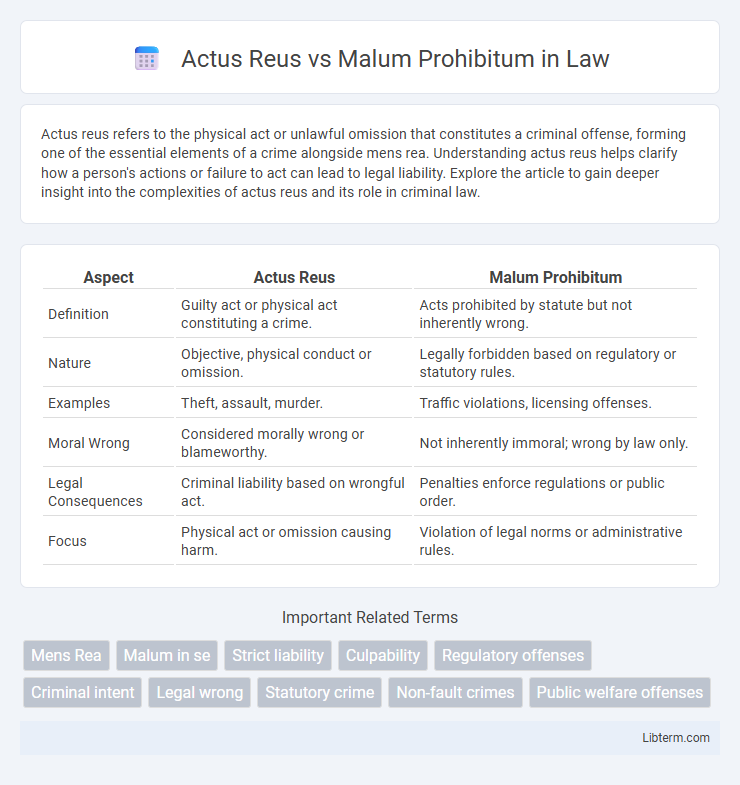Actus reus refers to the physical act or unlawful omission that constitutes a criminal offense, forming one of the essential elements of a crime alongside mens rea. Understanding actus reus helps clarify how a person's actions or failure to act can lead to legal liability. Explore the article to gain deeper insight into the complexities of actus reus and its role in criminal law.
Table of Comparison
| Aspect | Actus Reus | Malum Prohibitum |
|---|---|---|
| Definition | Guilty act or physical act constituting a crime. | Acts prohibited by statute but not inherently wrong. |
| Nature | Objective, physical conduct or omission. | Legally forbidden based on regulatory or statutory rules. |
| Examples | Theft, assault, murder. | Traffic violations, licensing offenses. |
| Moral Wrong | Considered morally wrong or blameworthy. | Not inherently immoral; wrong by law only. |
| Legal Consequences | Criminal liability based on wrongful act. | Penalties enforce regulations or public order. |
| Focus | Physical act or omission causing harm. | Violation of legal norms or administrative rules. |
Understanding Actus Reus: The Physical Act of Crime
Actus Reus refers to the physical act or unlawful omission that constitutes a crime, serving as a crucial element in establishing criminal liability. It involves voluntary conduct that breaches a legal duty, distinguishing it from Malum Prohibitum offenses, which are prohibited by statute without inherent moral wrongdoing. Understanding Actus Reus requires analyzing the defendant's actions or omissions and their direct connection to the criminal outcome.
Defining Malum Prohibitum: Prohibited by Law
Malum Prohibitum refers to actions that are prohibited by statute or regulation rather than inherently wrong by nature, distinguishing them from Malum In Se offenses which are universally considered morally wrong. This legal classification highlights that the illegality of Malum Prohibitum acts arises strictly from legislative decree, such as traffic violations or regulatory infractions. Understanding this distinction aids in assessing intent and culpability, as Malum Prohibitum crimes often do not require proof of criminal intent for conviction.
Key Differences: Actus Reus vs Malum Prohibitum
Actus Reus refers to the physical act or unlawful omission that constitutes a criminal offense, emphasizing the conduct element required for criminal liability. Malum Prohibitum involves acts prohibited by statute but not inherently evil, focusing on regulatory offenses that reflect societal standards rather than moral wrongdoing. The key difference lies in Actus Reus being a fundamental component of crime demonstrating voluntary wrongdoing, while Malum Prohibitum relates to violations of rules established to maintain public order without necessarily implying moral culpability.
Historical Origins of Actus Reus and Malum Prohibitum
The concept of Actus Reus originates from early English common law, emphasizing the physical act or unlawful omission as a fundamental element of criminal liability. Malum Prohibitum, in contrast, stems from statutory regulations defining actions prohibited by law rather than inherently wrong acts, reflecting a shift towards legislated governance during industrialization. Historical legal systems distinguished these concepts to separate moral wrongdoing (Malum in Se) from offenses criminalized for societal order and regulatory compliance.
Legal Implications of Actus Reus Offenses
Actus reus refers to the physical act or unlawful omission that constitutes a criminal offense, requiring proof of a voluntary action or conduct causing harm, whereas malum prohibitum pertains to acts prohibited by statute regardless of moral wrongfulness. Legal implications of actus reus offenses include establishing a direct causal link between the defendant's conduct and the criminal outcome, which is crucial for securing conviction in crimes involving violence, property damage, or negligence. Courts rigorously evaluate the presence of a voluntary act to differentiate criminal liability from accidental or involuntary conduct, impacting sentencing severity and defenses available to the accused.
Examples of Malum Prohibitum Crimes
Malum prohibitum crimes are offenses that are prohibited by statute but are not inherently immoral, such as jaywalking, parking violations, and licensing infractions like fishing without a permit. These crimes emphasize regulatory compliance rather than moral wrongdoing and often carry penalties designed to maintain public order and safety. Unlike malum in se crimes, malum prohibitum offenses do not require proof of criminal intent, highlighting the importance of statutory knowledge.
Moral Blameworthiness and Legal Prohibitions
Actus Reus refers to the physical act or conduct that constitutes a criminal offense, which aligns closely with moral blameworthiness due to the deliberate or negligent behavior involved. Malum Prohibitum, by contrast, encompasses acts deemed illegal solely because they violate statutory prohibitions, without inherent immorality or blameworthiness. Legal prohibitions under Malum Prohibitum aim to regulate social order and public welfare, emphasizing compliance over moral judgment.
Actus Reus in Criminal Law: Case Studies
Actus Reus, a fundamental element in criminal law, refers to the physical act or unlawful omission that constitutes a crime. Case studies such as *R v. Miller* illustrate how a defendant's failure to act upon creating a dangerous situation satisfies the actus reus requirement. This contrasts with Malum Prohibitum offenses, which involve prohibited acts not inherently wrong but deemed illegal by statute.
Challenges in Prosecuting Malum Prohibitum Acts
Prosecuting malum prohibitum acts presents challenges due to their basis on regulatory violations rather than inherent moral wrongdoing, often resulting in ambiguous intent requirements and fluctuating enforcement standards. Courts grapple with differentiating between strict liability offenses and those necessitating mens rea, complicating defendants' ability to mount effective defenses. This legal ambiguity can lead to inconsistent sentencing and calls for clearer statutory language to better define prohibited conduct and culpability thresholds.
The Future of Actus Reus and Malum Prohibitum in Legal Systems
The future of actus reus and malum prohibitum in legal systems hinges on evolving interpretations of human behavior and societal norms, with actus reus maintaining its fundamental role as the physical element of crime. Emerging technologies, such as AI and digital surveillance, challenge traditional notions of actus reus by complicating the determination of voluntary acts. Meanwhile, malum prohibitum offenses may expand due to regulatory growth, emphasizing compliance over moral wrongdoing, and necessitate clearer legal frameworks to balance enforcement with individual rights.
Actus Reus Infographic

 libterm.com
libterm.com